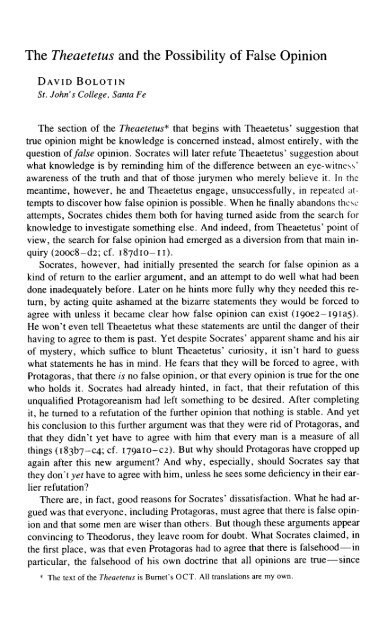Teaching and the Decline of Liberty at Credulity and Curiosity in A ...
Teaching and the Decline of Liberty at Credulity and Curiosity in A ...
Teaching and the Decline of Liberty at Credulity and Curiosity in A ...
You also want an ePaper? Increase the reach of your titles
YUMPU automatically turns print PDFs into web optimized ePapers that Google loves.
The Theaetetus <strong>and</strong> <strong>the</strong> Possibility <strong>of</strong> False Op<strong>in</strong>ion<br />
David Bolot<strong>in</strong><br />
St. John's College, Santa Fe<br />
The section <strong>of</strong> <strong>the</strong> Theaetetus* th<strong>at</strong> beg<strong>in</strong>s with Theaetetus'<br />
suggestion th<strong>at</strong><br />
true op<strong>in</strong>ion might be knowledge is concerned <strong>in</strong>stead, almost entirely, with <strong>the</strong><br />
question <strong>of</strong>false op<strong>in</strong>ion. Socr<strong>at</strong>es will l<strong>at</strong>er refute Theaetetus'<br />
wh<strong>at</strong> knowledge is by rem<strong>in</strong>d<strong>in</strong>g<br />
him <strong>of</strong> <strong>the</strong> difference between an<br />
suggestion about<br />
eye-<br />
awareness <strong>of</strong> <strong>the</strong> truth <strong>and</strong> th<strong>at</strong> <strong>of</strong> those jurymen who merely believe it. In <strong>the</strong><br />
meantime, however, he <strong>and</strong> Theaetetus engage, unsuccessfully, <strong>in</strong> repe<strong>at</strong>ed <strong>at</strong><br />
tempts to discover how false op<strong>in</strong>ion is possible. When he f<strong>in</strong>ally ab<strong>and</strong>ons <strong>the</strong>se<br />
<strong>at</strong>tempts, Socr<strong>at</strong>es chides <strong>the</strong>m both for hav<strong>in</strong>g turned aside from <strong>the</strong> search for<br />
knowledge to <strong>in</strong>vestig<strong>at</strong>e someth<strong>in</strong>g else. And <strong>in</strong>deed, from Theaetetus'<br />
po<strong>in</strong>t <strong>of</strong><br />
view, <strong>the</strong> search for false op<strong>in</strong>ion had emerged as a diversion from th<strong>at</strong> ma<strong>in</strong> <strong>in</strong><br />
quiry (200c8-d2; cf. i87dio-n).<br />
Socr<strong>at</strong>es, however, had <strong>in</strong>itially presented <strong>the</strong> search for false op<strong>in</strong>ion as a<br />
<strong>and</strong> an <strong>at</strong>tempt to do well wh<strong>at</strong> had been<br />
k<strong>in</strong>d <strong>of</strong> return to <strong>the</strong> earlier argument,<br />
done <strong>in</strong>adequ<strong>at</strong>ely before. L<strong>at</strong>er on he h<strong>in</strong>ts more fully why <strong>the</strong>y needed this re<br />
turn, by act<strong>in</strong>g quite ashamed <strong>at</strong> <strong>the</strong> bizarre st<strong>at</strong>ements <strong>the</strong>y would be forced to<br />
agree with unless it became clear how false op<strong>in</strong>ion can exist (i9oe2- 19135).<br />
He won't even tell Theaetetus wh<strong>at</strong> <strong>the</strong>se st<strong>at</strong>ements are until <strong>the</strong> danger <strong>of</strong> <strong>the</strong>ir<br />
hav<strong>in</strong>g<br />
<strong>of</strong> mystery,<br />
to agree to <strong>the</strong>m is past. Yet despite Socr<strong>at</strong>es'<br />
which suffice to blunt Theaetetus'<br />
apparent shame <strong>and</strong> his air<br />
curiosity, it isn't hard to guess<br />
wh<strong>at</strong> st<strong>at</strong>ements he has <strong>in</strong> m<strong>in</strong>d. He fears th<strong>at</strong> <strong>the</strong>y will be forced to agree, with<br />
Protagoras, th<strong>at</strong> <strong>the</strong>re is no false op<strong>in</strong>ion, or th<strong>at</strong> every op<strong>in</strong>ion is true for <strong>the</strong> one<br />
who holds it. Socr<strong>at</strong>es had already h<strong>in</strong>ted, <strong>in</strong> fact, th<strong>at</strong> <strong>the</strong>ir refut<strong>at</strong>ion <strong>of</strong> this<br />
unqualified Protagoreanism had left someth<strong>in</strong>g to be desired. After complet<strong>in</strong>g<br />
it, he turned to a refut<strong>at</strong>ion <strong>of</strong> <strong>the</strong> fur<strong>the</strong>r op<strong>in</strong>ion th<strong>at</strong> noth<strong>in</strong>g is stable. And yet<br />
his conclusion to this fur<strong>the</strong>r argument was th<strong>at</strong> <strong>the</strong>y were rid <strong>of</strong> Protagoras, <strong>and</strong><br />
th<strong>at</strong> <strong>the</strong>y didn't yet have to agree with him th<strong>at</strong> every man is a measure <strong>of</strong> all<br />
th<strong>in</strong>gs (i83b7-c4; cf. i79aio-c2). But why should Protagoras have cropped up<br />
aga<strong>in</strong> after this new argument? And why, especially, should Socr<strong>at</strong>es say th<strong>at</strong><br />
<strong>the</strong>y don't yet have to agree with him, unless he sees some deficiency <strong>in</strong> <strong>the</strong>ir ear<br />
lier refut<strong>at</strong>ion?<br />
There are, <strong>in</strong> fact,<br />
good reasons for Socr<strong>at</strong>es'<br />
gued was th<strong>at</strong> everyone, <strong>in</strong>clud<strong>in</strong>g Protagoras,<br />
diss<strong>at</strong>isfaction. Wh<strong>at</strong> he had ar<br />
must agree th<strong>at</strong> <strong>the</strong>re is false op<strong>in</strong><br />
ion <strong>and</strong> th<strong>at</strong> some men are wiser than o<strong>the</strong>rs. But though <strong>the</strong>se arguments appear<br />
conv<strong>in</strong>c<strong>in</strong>g to Theodorus, <strong>the</strong>y leave room for doubt. Wh<strong>at</strong> Socr<strong>at</strong>es claimed, <strong>in</strong><br />
<strong>the</strong> first place, was th<strong>at</strong> even Protagoras had to agree th<strong>at</strong> <strong>the</strong>re is falsehood <strong>in</strong><br />
particular, <strong>the</strong> falsehood <strong>of</strong> his own doctr<strong>in</strong>e th<strong>at</strong> all op<strong>in</strong>ions are true s<strong>in</strong>ce<br />
* The text <strong>of</strong> <strong>the</strong> Theaetetus is Burnet's OCT. All transl<strong>at</strong>ions are my own.
















